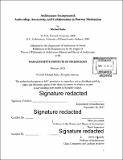| dc.contributor.advisor | Mark Jarzombek. | en_US |
| dc.contributor.author | Kubo, Michael | en_US |
| dc.contributor.other | Massachusetts Institute of Technology. Department of Architecture. | en_US |
| dc.date.accessioned | 2018-05-23T16:33:22Z | |
| dc.date.available | 2018-05-23T16:33:22Z | |
| dc.date.copyright | 2018 | en_US |
| dc.date.issued | 2018 | en_US |
| dc.identifier.uri | http://hdl.handle.net/1721.1/115755 | |
| dc.description | Thesis: Ph. D., Massachusetts Institute of Technology, Department of Architecture, 2018. | en_US |
| dc.description | Cataloged from PDF version of thesis. | en_US |
| dc.description | Includes bibliographical references (pages 305-344). | en_US |
| dc.description.abstract | A broad transformation occurred in the scale and scope of professional architectural practice in the United States in the decades after World War II. My dissertation explores this shift, in particular the rise of the body of collaborative and team-based methods of production that would come to be labeled as corporate architectural practice. An exploration of these practices reveals a climate of speculation in the postwar period on the corporation as a social and institutional form, and a widespread interest in the potentials of anonymous and collective methods to reshape the nature and objects of architectural production. Tracing the history of these collaborative approaches from progressive project to the critique of the corporate, the dissertation challenges the historiographic methods premised on singular authorship that have governed existing interpretations of postwar modernism. While there exists a growing body of work on architecture produced for corporations in the postwar period, far less critical attention has been paid to its corollary: the corporate production of architecture itself. Despite the dominant role of large firms within mainstream architectural practice in the United States, a comprehensive account has yet to be written of the motivations for and growth of such practices after 1945, the shifting economic and political conditions which underlay their production, and the problematic reception of their work by architectural critics after the 1970s, predicated on notions of signature and authorship which remained essentially unchanged despite these radical shifts in the nature of production. The dissertation proposes a cultural and discursive history of corporate architectural practice, from its origins and international extension to its built products and their reception within the architectural field. I explore these transformations in architecture through the history of The Architects Collaborative (TAC), founded in 1945 as an experiment in team-based design methods by seven young practitioners together with German émigré Walter Gropius. Despite the extensive historiography of Gropius and his work prior to 1945, there is as yet no detailed history of TAC itself, the largest architectural firm in the U.S. by the 1970s and the collective body through which Gropius practiced for the last twenty-five years of his career. An exploration of the firm's origins and expansion, its sustained legacy of work in the Middle East and Europe in the decades after World War II, and its eventual demise in 1995 reveals the contested stakes around questions of anonymity, authorship, and expertise at the heart of the U.S. architectural corporation and its continuing global impact up to the present. | en_US |
| dc.description.statementofresponsibility | by Michael Kubo. | en_US |
| dc.format.extent | 574 pages | en_US |
| dc.language.iso | eng | en_US |
| dc.publisher | Massachusetts Institute of Technology | en_US |
| dc.rights | MIT theses are protected by copyright. They may be viewed, downloaded, or printed from this source but further reproduction or distribution in any format is prohibited without written permission. | en_US |
| dc.rights.uri | http://dspace.mit.edu/handle/1721.1/7582 | en_US |
| dc.subject | Architecture. | en_US |
| dc.title | Architecture incorporated : authorship, anonymity, and collaboration in postwar modernism | en_US |
| dc.type | Thesis | en_US |
| dc.description.degree | Ph. D. | en_US |
| dc.contributor.department | Massachusetts Institute of Technology. Department of Architecture | |
| dc.identifier.oclc | 1036987084 | en_US |
